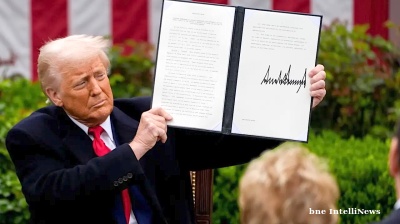Latvian President Raimonds Vejonis has nominated Maris Kucinskis as the country's new prime minister, springing something of a surprise in the process.
“In line with the Latvian constitution, I invite Maris Kucinskis to form a cabinet,” Vejonis told reporters on January 13 after the latest round in more than a months of talks that have at times been bordering on the farcical, with parties playing a protracted game of “I won't show you my candidate if you don't show me yours first".
As a result of the nomination, Kucinskis now faces the task of hammering out a coalition agreement, most likely with the same three parties in the outgoing coalition: the centre-right Unity party of departing Prime Minister Laimdota Straujuma, the rightwing National Alliance, and his own Green and Farmers Union, a centrist party with populist appeal, particularly among pensioners and farmers.
The move is a serious blow to the Unity Party, which has led the government since 2009 and whose own candidate for the prime minister position, Karlis Sadurskis, stood beside Vejonis and Kucinskis as the announcement was made and sportingly shook hands with his rival.
Sadurskis was thought the candidate most likely to secure the nomination as Unity is the largest of the three coalition parties, with 23 seats compared with ZZS' 21.
However, Machiavellian wrangles within the ironically-named Unity have dominated the headlines since Straujuma's resignation on December 7 and it is this suspicion that Unity may itself be on the verge of a schism that is likely to have swayed Vejonis' decision to go with ZZS – plus the fact that he was himself a ZZS MP until assuming the presidency last year.
If Kucinskis is successful in cobbling together a workable majority in the 100-seat Saeima, it will mean the country will be governed by the third-largest party in parliament behind Unity and the pro-Russian Harmony party, which has 24 seats.
Kucinskis, 54, is regarded as a political fixer, having previously been in several other parties which are now no longer in existence, most notably the People's Party of Andris Skele, which dominated the early 2000s but which disintegrated in unseemly oligarchic factionalism. But Kucinskis was an effective parliamentary whip for both the People's Party and its short-lived successor For The Good Of Latvia, another oligarch-controlled party.
Indeed, by joining ZZS in 2014 he now has the dubious distinction of working for all three of Latvia's main political oligarchs: former PM Andris Skele (People's Party), former transport minister Ainars Slesers (For The Good Of Latvia) and now ZZS bankroller Aivars Lembergs, currently eight years into a trial on major graft charges which hasn't stopped him helping to choose the prime minister.
Some attention will inevitably now focus on whether a Kucinskis government will be supportive of Lembergs' business interests, primarily in the transit sector. But despite swimming for so long in such murky waters, Kucinskis himself is seen as more of an old-school political fixer than a gold-digger. He is good at holding meetings and has excellent contacts in local government, so while being an ideology-free zone he should at least be able to perform the basic functions of government with some degree of competence.
Before joining ZZS Kucinskis was even wooed briefly by Unity – and its failure to recruit him has now bitten it firmly on the backside. But having the top seat at the table also presents a challenge to ZZS which likes to be in government but also likes to avoid as much responsibility as possible so that it can make its populist pitches on pensions and subsidies to its voters. Therefore Unity is likely to keep hold of many of the more controversial ministries, though ZZS' current Economics Minister Dana Reizniece-Ozola may switch to take control of the finance ministry after current Finance Minister Janis Reirs impressed no-one by turning down the chance to become prime minister.
Most likely the humiliated Unity party will remain in the coalition but in the event that they do not it would be a sorry end indeed for a party that under Valdis Dombrovskis was the poster child of EU austerity. When the Maxima supermarket in the Zolitude suburb of Riga collapsed in November 2013, killing 54, it forced Dombrovskis' resignation. While he has since gone on to greater things in Brussels, the moment he quit seems to have marked the beginning of the end for Unity.
News

European foreign ministers hit out at Georgian ruling party
Statement condemned ongoing democratic backsliding by the ruling Georgia Dream party, which has consolidated power via crackdowns on independent media, NGOs, activists and opposition politicians.
_1752493253.jpg)
RSF urges EU action over police violence against journalists in Serbia
Press freedom watchdog Reporters Without Borders warned abuses threaten the country’s EU accession process.

US and Panama launch joint military exercises amid canal security concerns
US helicopters have arrived in Panama to begin collaborative training exercises with local security forces, as tensions mount over the strategic waterway's future amid competing US and Chinese interests.

Migration pushes EU population to record high, but CEE countries continue to shrink
Immigration outweighed the natural population decline in 2024 in just three of the newer EU member states – Croatia, Czechia and Slovenia.



